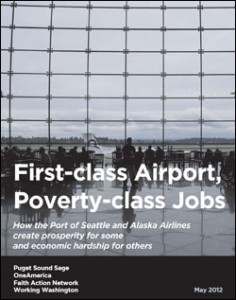LOCAL
Report: Alaska profits at expense of SeaTac workers
 SEATTLE (May 15) — Alaska Airlines will celebrate another profitable year at its shareholder meeting today. But a new report, First-Class Airport, Poverty-Class Jobs, finds that more than 2,800 workers at SeaTac International Airport — wheelchair attendants, skycaps, ramp workers, baggage handlers, cabin cleaners and jet fuel technicians — make poverty wages.
SEATTLE (May 15) — Alaska Airlines will celebrate another profitable year at its shareholder meeting today. But a new report, First-Class Airport, Poverty-Class Jobs, finds that more than 2,800 workers at SeaTac International Airport — wheelchair attendants, skycaps, ramp workers, baggage handlers, cabin cleaners and jet fuel technicians — make poverty wages.
These workers are not directly employed by the airlines, or by the Port of Seattle. Instead, they work for companies that provide contracted services to the major airlines. In the process, these jobs that once paid family wages, now pay several dollars less per hour.
Alex Popescu, who fuels planes at SeaTac Airport, says he and his co-workers are tired of sliding backward on pay and benefits. He says some of the contract companies offer health insurance but, at rates that eat up about a quarter of a worker’s pre-tax income, few are able to afford it.
“That’s what we want, is to be working class — you know, not poverty level class — just to get treated with some kind of respect and dignity,” he said. “And for management and the Port and everybody else to realize that it’s because of us that you guys are so successful.”
The new report, authored by Puget Sound Sage, OneAmerica, Faith Action Network and Working Washington, found:
- Alaska Air Group posted a profit of $251.1 million in 2010 — a record — and another profit of $244.5 million in 2011. While industry stock value fell an average of 25% last year, Alaska Air Group stock rose 30% and its 2010 profit margin of 6.6% was the highest margin of any major carrier.
- A survey of 310 SeaTac contract workers and a review of government data show that average wage of these workers is $9.70 an hour ($20,176 a year, if they work full time) — a scant $1,600 above the federal poverty threshold for a family of three.
- Nearly two-thirds of workers surveyed are people of color, immigrants and refugees.
- A key component of the company’s strategy to increase profits has been to contract out increasing portions of its workforce and operations. In the last decade, the value of the work Alaska contracted out has grown from $82 million to $185.1 million.
Alaska Air’s strategy to shed good jobs by contracting out to companies that pay poverty wages has improved the company’s bottom line in the short term, but at a tremendous cost to workers, communities and the integrity of their business in the long run, the report concludes.
Workers and advocacy groups are asking the Port of Seattle to establish living-wage standards for all airport jobs. The report says the use of airline contractors has created what it calls a “subclass of poverty-wage workers” who rely on state and federal public assistance to make ends meet. It also says the Port of Seattle has stated that, for legal reasons, it cannot intervene in business relationships between airlines and their contractors.
But David Mendoza, policy analyst with Puget Sound Sage, points out that SeaTac contract workers are paid much less than those at other airports.
“Alaska has operations up and down the West Coast where it’s paying workers up to $14.97 an hour,” he said. “That’s because those port authorities have mandated that these companies step up and treat their workers better. And our Port of Seattle has, so far, failed to do so.”
For more information, visit workingwa.org.
► ALSO, today at Slog — New report highlights poverty wages at airport — Back in 2004 when a gallon of gas averaged $1.77 at the pump, a loaf of bread cost $0.95, a pound of bacon $3.13, and a gallon of milk $2.79, Paul Jordan earned $10.00 an hour as a skycap at Seattle-Tacoma International Airport. Eight years later gasoline costs about four bucks a gallon, a loaf of bread $1.40, a pound of bacon $4.60, and a gallon of milk $3.50. But Jordan still only earns $10.00 an hour handling baggage.





